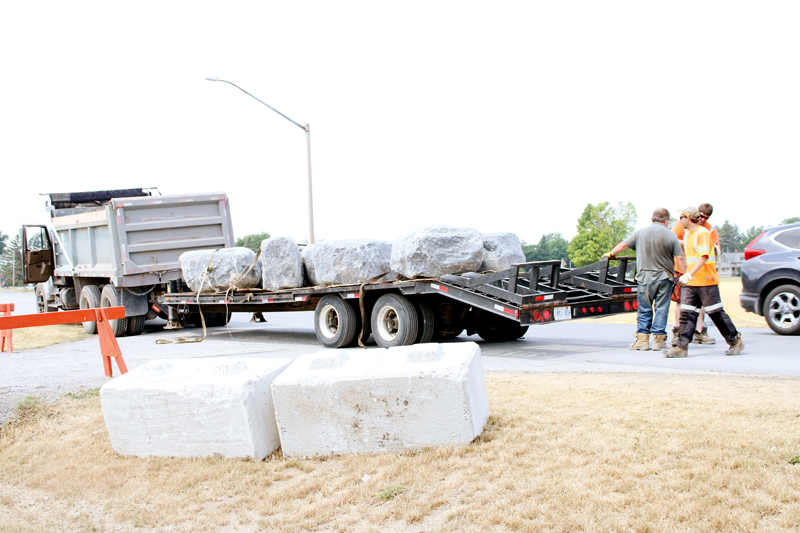A barrier of stones
Workers begin to unload a load of gigantic stones near the Morrisburg beach entrance which will be used in an attempt to stop people from driving over the nearby parkland. In the front of the photo are two of the large concrete barriers which will be located at the entrance to the beach parking lot on the weekends when the beach is closed. Staff photo
MORRISBURG – The hot temperatures has resulted in many people seeking relief from the heat and humidity along the St. Lawrence waterfront. On July 2 the Municipality of South Dundas announced the temporary closure of the beach areas in Morrisburg and Iroquois on weekends commencing on July 4 until further notice, with the beaches remaining open through the week. This announcement was made as a result of large numbers of people accessing the beaches on the weekends since their opening on June 22, which raised concerns about lack of physical distancing during the Covid-19 pandemic. Recently there have been concerns raised about the volume of traffic and parking along side the waterfront in Morrisburg, especially on the weekends.
A special meeting of South Dundas council was held on Tues., July 7 to discuss this matter with Mayor Steven Byvelds, expressing as it began, his concerns on this matter and the apparent lack of respect shown to the waterfront. Deputy mayor Kirsten Gardner commented how she noticed there was an “overwhelming” number of visitors to the waterfront with a lack of social distancing and other issues on Sun., July 5.
Coun. Don Lewis expressed how it appeared people along the waterfront were acting in a disrespectful manner to the physical space as well as to individuals when he visited the park on Mon., July 6. He continued how he felt measures have to be taken at this time to resolve the situation.
Coun. Archie Mellan hoped a solution could be found for residents to be able to access the waterfront. He visited the park on Sunday and commented how “it was really disheartening to see our facilities” abused by those utilizing the space and taken advantage of, regardless of where the visitors came from. He commented how what he saw was not what was envisioned for the space during the creation of the Master Plan for the Morrisburg Waterfront and commented a solution to this problem needs to be found.
Coun. Lloyd Wells re-iterated his belief that this green space should be “for the kids, for picnics, no vehicles” and feels the Waterfront Park needs a permanent solution to the parking problem. He commented there was a need for signage, finding alternative parking areas and perhaps instituting fees for parking and use of the site.
Danielle Watson, director of Environmental Services, provided a number of alternative solutions to the problems associated with the use of the Morrisburg waterfront, which includes concerns over parking areas at the site. During her presentation, Watson explained some measures are already being implemented including the installation of large boulders to inhibit parking on the grass.
Byvelds commented how cars with trailers need to park somewhere other than at the waterfront, and that there is a need for accessible parking, and boulders on the pathway. He had a couple of suggestions such as charging for parking, erecting a barrier at Docksyde to stop access to the pathway or install a speed inhibitor and use only a specified area for parking. Gardner agreed with Byvelds on several points such as the need for accessible parking the use of boulders. She noted driving on the grass needs to be addressed, using large signs to provide information on use of area and a method of education followed by enforcement for non compliance. She commented there was a need to develop a plan for the creation of additional parking. Wells feels the “green space should be green space,” with no vehicles east of the washroom and using boulders as a barrier in several locations at the waterfront park and provided suggestions as to how the limiting of persons on beaches could be done. He raised concerns about parking for boaters both on and offsite. Lewis had several suggestions on how to limit parking on grass including the use of boulders and fencing to limit access points to the area before commenting golf carts should not be allowed on green spaces. Mellan agreed there was a need for a fence to inhibit parking on the grass, signage, wondered about fines for parking on grass and signage at the dock to “direct the trailers and trucks and cars” to an offsite parking location with clear indications they are not to park on the grass.
There was a significant amount of discussion about these issues, which included camping along the waterfronts in South Dundas, with staff moving forward with plans to ensure the safety of persons and property at the waterfront.










